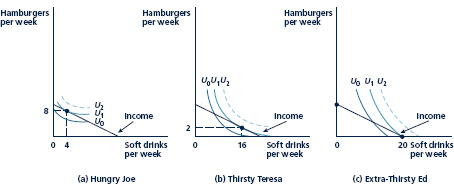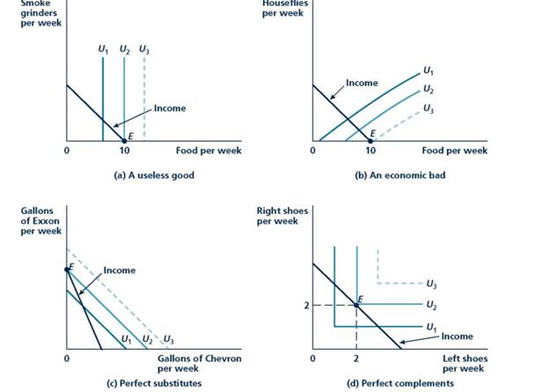
Intermediate Microeconomics and Its Application 12th Edition by Walter Nicholson,Christopher Snyder
Edition 12ISBN: 978-1133189022
Intermediate Microeconomics and Its Application 12th Edition by Walter Nicholson,Christopher Snyder
Edition 12ISBN: 978-1133189022 Exercise 15
Figure and Figure show that the condition for utility maximization should be amended sometimes to deal with special situations.
1. Explain how the condition should be changed for ''boundary'' issues such as those shown in Figure and, where people buy zero amounts of some goods. Use this to explain why your authors never buy any lima beans.
FIGURE Difference in Preference Result in Differing Choices
The three individuals illustrated here all have the same budget constraint. They have $30 to spend, hamburgers cost $3, and soft drinks cost $1.50. These people choose very different consumption bundles because they have differing preferences for the two goods.
2. How do you interpret the condition in which goods are perfect complements, such as those shown in Figure 2.9(d)? If left and right shoes were sold separately, could any price ratio make you depart from buying pairs?
FIGURE Utility-Maximizing Choices for Special Types of Goods
The four panels in this figure repeat the special indifference curve maps from Figure The resulting utility-maximizing positions (denoted by E in each panel) reflect the specific relationships among the goods pictured.
1. Explain how the condition should be changed for ''boundary'' issues such as those shown in Figure and, where people buy zero amounts of some goods. Use this to explain why your authors never buy any lima beans.
FIGURE Difference in Preference Result in Differing Choices

The three individuals illustrated here all have the same budget constraint. They have $30 to spend, hamburgers cost $3, and soft drinks cost $1.50. These people choose very different consumption bundles because they have differing preferences for the two goods.
2. How do you interpret the condition in which goods are perfect complements, such as those shown in Figure 2.9(d)? If left and right shoes were sold separately, could any price ratio make you depart from buying pairs?
FIGURE Utility-Maximizing Choices for Special Types of Goods

The four panels in this figure repeat the special indifference curve maps from Figure The resulting utility-maximizing positions (denoted by E in each panel) reflect the specific relationships among the goods pictured.
Explanation
1) Consider the graph below: In graph (...
Intermediate Microeconomics and Its Application 12th Edition by Walter Nicholson,Christopher Snyder
Why don’t you like this exercise?
Other Minimum 8 character and maximum 255 character
Character 255



